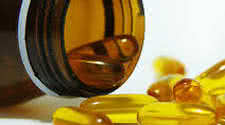Body Builders Science: Insulin & Vitamin E

Advanced Nutrition & Science
Rumors abound that insulin use is rampant among bodybuilders, particularly in the pro ranks. In fact, a few bodybuilding pundits explain that the now-common appearance of 260-pound muscular behemoths in contest condition is the direct result of a potent anabolic combination of
insulin, growth hormone and testosterone. While there is no foolproof way to verify such rumors, the fact is that these three hormones do provide a dynamic, synergistic anabolic effect in muscle. Many bodybuilders aren't familiar with the potential interactions among hormones
and nutrients in the body. For example, insufficient intake of carbohydrates and proteins will render insulin and growth hormone useless in terms of anabolic response. More arcane hormone/nutrient interactions are just now coming under scientific scrutiny.
Recent work shows that vitamin A can aid in glucose disposal in the body. This puts vitamin A on par with more familiar glucose regulators, such as the trace minerals chromium and vanadyl. A new study, published in the journal Metabolism (45:998-1003, 1996), shows that insulin
use rapidly lowers vitamin E levels in humans. The subjects included no insulin-dependent diabetics, people with high blood pressure, obese people and 12 healthy subjects. After they were given insulin, all of these disparate participants showed decreased levels of vitamin E
in their blood.
Scientists know that under conditions of insulin resistance or hyperinsulinemia (in which excess insulin is secreted), the incidence of cardiovascular disease increases. While excess insulin itself damages blood-vessel walls, the higher blood pressure resulting from increased
insulin output is a far more potent cause of arterial damage, and such damage is related to the inception of arteriosclerosis. It is also well established that the type of cholesterol circulating in blood that is most associated with cardiovascular disease (low-density lipopratein,
or LDL) is only dangerous when if's oxidized, Dietary antioxidants, such as vitamins C and E, are thought to help prevent oxidation and thus help prevent cardiovascular disease.
The Metabolism study shows that insulin drives vitamin E out of the blood and into fat-soluble tissues, such as cell membranes. Vitamin E is normally carried in the blood as port of the LDI. complex, preventing its oxidation. Without sufficient vitamin E in the blood, is far mare
likely to oxidize, which leads to arteriosclerosis. The authors of that study also note that insulin may directly cause free radical activity, and thus may independently, provoke oxidation in the body. In addition, insulin promotes high blood pressure by stimulating the release
of aldosterone from the adrenal glands, which subsequently leads to sodium and water retention.
As if this weren't bad enough, excess insulin forces glucose into the body's tissues, where it combines with protein. The affected tissues are structurally weakened and subject to premature aging. Of course, from a pragmatic viewpoint, fat-building is the most immediate problem
pertaining to insulin. Under conditions of high insulin activity, fat mobilization stops. Insulin is a "storage" hormone favoring protein, carbohydrate and fat retention. If the rumors of insulin use among bodybuilders are true, it would be prudent for those who are taking it
to also take a hefty daily dose of vitamin E (ranging from 400 to 1,000 international units). Better yet, chuck the insulin altogether - unless, of course, you're a diabetic.